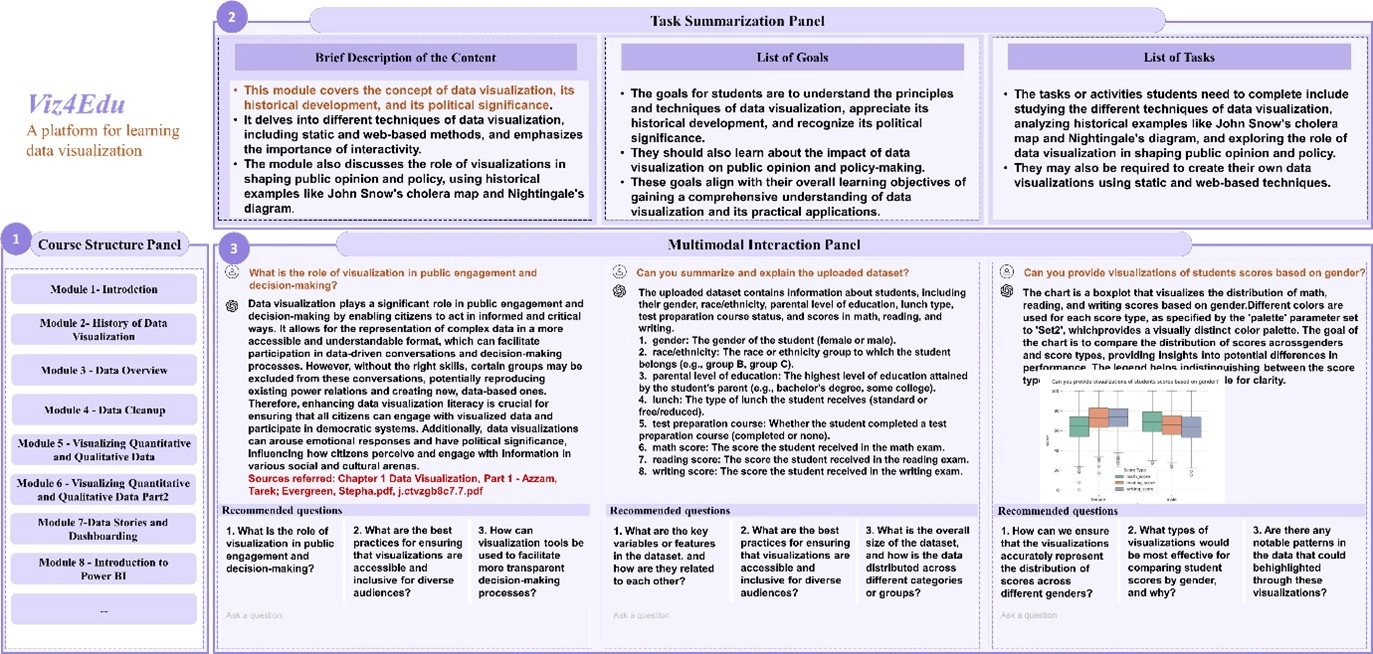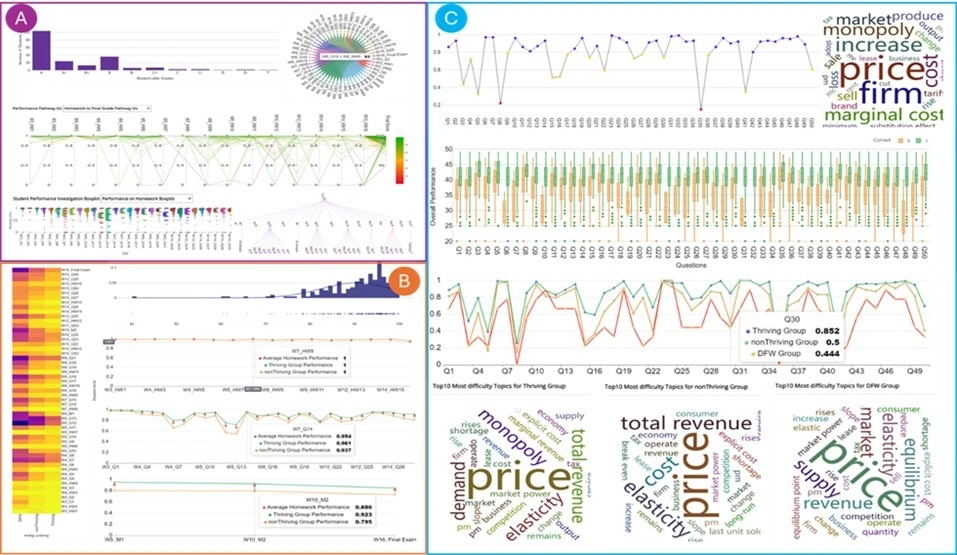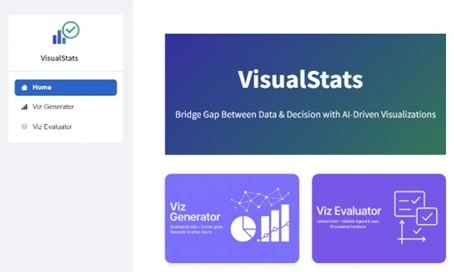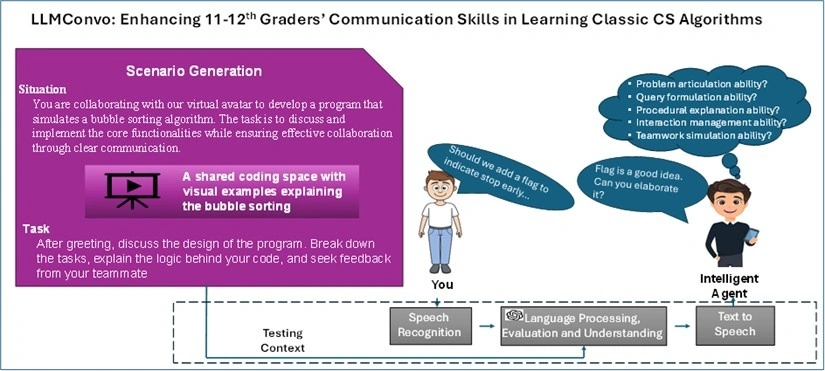AI IN EDUCATION
This project investigates the use of artificial intelligence to support personalized learning, enhance teaching practices, and address key ethical issues in education. We explore how AI can deliver adaptive feedback, guide instruction, and empower data-informed decision-making, while critically examining concerns around fairness, transparency, privacy, and the evolving role of educators. Our goal is to promote responsible, inclusive, and effective use of AI in learning environments.
SUBPROJECTS

Viz4Edu
This study introduces Viz4Edu, an LLM-powered interactive platform, to support student learning data visualization in online learning settings. Building on a course of Data Visualization in Education offered in a large public university, the platform incorporates three modules: Course Curriculum Module for incorporating learning materials within each module in the course to generate guidance aligning with the specific learning materials and objectives; Learning Guidance Agents for offering step-by-step, instant learning guidance to help students navigate complex topics and driving them to explore on the relevant topic in greater depth; and User Interaction Module for providing interfaces to facilitate interactions between students and AI agents on various learning tasks.

LearningViz
This study introduces LearningViz, an interactive learning analysis dashboard to help instructors identify, analyze, and close performance gaps among students in their classes. In this dashboard, we incorporated three modules to enhance human and computer interactions for better supporting the teaching practices: the Student Overall Performance Analysis Module, which provides a comprehensive understanding of students’ learning in the course; the Student Group Performance Analysis Module, which examines performance gaps across different groups and identifies factors contributing to these gaps; and the Final Exam Item Analysis Module, which evaluates the quality of exam questions and identifies strategies for closing performance gaps.

VisualStats
This study introduces VisualStats, a multimodal, AI-assisted platform designed to support end-to-end statistical data visualization. The system comprises two interactive agents: Viz Generator, which interprets user goals, transforms data into visualization strategies, and generates charts through natural language dialogue; and Viz Evaluator, which interprets existing charts in context, provides human-readable explanations, and offers detailed evaluations based on best practices in visual design. By combining the interpretability of MLLMs with structured visualization workflows, VisualStats aims to reduce cognitive and technical burdens in data visualization while enhancing user agency, creativity, and analytical thinking. Through continuous, dialogic interaction, the platform enables learners to iteratively construct, critique, and revise visual representations of data—an approach that not only improves visualization outcomes but also supports deeper statistical understanding.

LLMConvo
This project develops LLMConvo, an immersive environment to enhance 11-12th graders’ communication skills to support them in learning the required classic algorithms such as sorting and searching. LLMConvo cultivates those communication skills through two advancements: (1) Immersive and Authentic Communication Environments: LLMConvo leverages virtual reality (VR) technology combined with large language models (LLMs) to create immersive scenarios that simulate real-world collaborative coding scenarios, incorporating engaging examples to illustrate algorithms effectively. Students are immersed in the adaptive and sensory-rich environment to explore the mechanisms of algorithms and communicate with an avatar to practice their communication skills such as articulating ideas, explaining concepts, achieving consensus and so on; (2) Individualized and Instant Feedback: The virtual avatar in LLMConvo will generate instant and individualized responses that align with students’ communication proficiency and technical skill level during interaction processes. The instant responses will drive students to construct more effective communication strategies by refining their ability to articulate ideas clearly, respond constructively, and adapt interaction styles strategically.
Publications
Z. Zhang, B. Pei, J. Hatten, & Z. Zhou. (2024). "Examining Student Learning Engagement in Canvas to Support Personalized Learning." 2024 IEEE Frontiers in Education Conference (FIE), Washington, DC, USA, pp. 1-8.
Joyce, T., B. Pei, Cheng, A., Ambrose, A., & Mulholland, B. (2025). Enhancing Mastery-Based Learning: An Analytical Approach to Providing Actionable Support. In 10.4018/979-8-3693-9466-3.ch003.
B. Pei, Cheng, Y., Ambrose, A., et al. (2024). LearningViz: a dashboard for visualizing, analyzing and closing learning performance gaps—a case study approach. Smart Learn. Environ., 11, 56.
B. Pei, & Xing, W. (2021). An Interpretable Pipeline for Identifying At-Risk Students. Journal of Educational Computing Research, 60(2), 380-405.
Duan, X., B. Pei, Ambrose, G.A., et al. (2024). Towards transparent and trustworthy prediction of student learning achievement by including instructors as co-designers: a case study. Educ Inf Technol, 29, 3075–3096.
Jing, X. & B, Pei. (2025). Viz4Edu: An LLM-Powered Adaptive Learning Platform for Data Visualization. In R. Jake Cohen (Ed.), Proceedings of Society for Information Technology & Teacher Education International Conference (pp. 2777-2780).
View Paper →